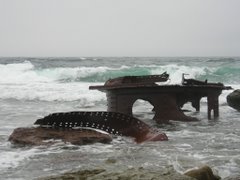
A habit is like a harness - it is a thing unto itself and has no particular relation to any behavior. It can be a willing servant or a terrible master. It takes about 3 weeks of mindful repetition to form a habit that will function automatically, that is, without any conscious effort. You cannot destroy a habit, but you can replace it with a new one. To quit smoking, for example, you must spend three weeks cultivating the habit of not smoking. How does this relate to fishing? Well, if you can develop a set of good habits, you are likely to become more successful and will probably enjoy your fishing more. Here's a story that illustrates what I mean.
One day, I invited my brother, Dave, to join me for some Atlantic Salmon fishing on the Medway River. It was early July and with the water low, I could hopscotch from rock to rock and get out to a place where I could clearly see salmon lying in the pool. Dave took up his position and began casting, while I observed the reactions of the fish. His fly landed gracefully, upstream and to the left of their lie, then swam with the current to pass just in front of their noses. The salmon ignored the fly for the most part, but on one particular cast, a fish surged up and, at the last moment, turned away. There followed many more casts with no reaction, when finally, I remembered that the salmon had risen to an errant cast that had fallen almost on top of the fish. I mentioned this to Dave and he promptly dropped a cast right on the money.
"You mean like this?" he asked.
Before I could reply, the salmon answered with a resounding smack at the fly, tasted the hook, and streaked across the pool. He leapt clear of the water, came down with a huge splash and, suddenly, the line went slack. Dave reeled in to find that all of his leader and a piece of the fly line itself was gone. When we examined the line, it was brittle, probably from exposure to insect repellent and sunlight. We could easily break pieces off with a sharp tug.
"When was the last time you checked your line?" I inquired.
"I haven't used this rod and reel since Grandy's River in Newfoundland," he replied, "two summers ago."
Right then and there, I vowed to make two habits that have increased my effectiveness as a guide: one - to always check the terminal tackle and test the knot and leader strength before a guest begins to cast, and two - to always pay close attention to exactly where each cast falls.
Postscript:
We replaced the leader and moved on to the next pool. Dave hooked a grilse at Little Salmon that gave his tackle a real workout as it cartwheeled high in the air, landed on a flat rock, flopped back into the water, swam under a sunken log, then back out again. After landing the fish, we both agreed that if we had only gotten video footage of that fish, we'd probably never have to work again. It was the most amazing piece of angling skill and shit luck either of us had ever seen.
Photo by W. R. MacAskill, "Medway River 1928" Nova Scotia Archives and Records Management.
Saturday, September 22, 2007
"Habits are at first cobwebs; at last chains." Old English saying.
Posted by
Random Phrump
at
12:08 PM
![]()
Labels: Atlantic Salmon, habit, Medway
Subscribe to:
Post Comments (Atom)




No comments:
Post a Comment